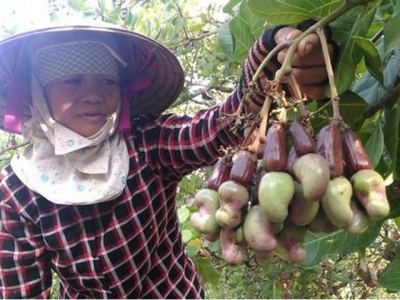Cashew industry suffers from weakness

A farmer is working on a cashew plantation in Binh Phuoc Province - PHOTO: TL
Ho Chi Minh City – Vietnam is expected to remain the world’s No. 1 cashew nut exporter in 2018 with a global market share of 65%, but local cashew enterprises have operated inefficiently, facing numerous problems, including shortages of raw materials and thin profit margins, Nguoi Lao Dong newspaper reported.
Citing a representative of the Vietnam Cashew Association (Vinacas), the newspaper said that as of May, Vietnam earned some US$1.4 billion from exporting 141,000 tons of cashew nuts, up 21.4% in volume and 25.35% in value. Vietnam’s cashew revenues are expected to reach US$3.7 billion in 2018, rising by US$80 million against last year.
Mentioning difficulties in Vietnam’s cashew industry, Nguyen Duc Thanh, chairman of Vinacas, lamented that farmers and processors who spend a great deal of money and time on farming and manufacturing cashews only saw an increase of 30-35% in profit, while foreign traders took the lion’s share of 65-70%.
“Such trade inequality is considerable, but we find it difficult to change since the production in Vietnam remains unstable,” he said.
A group of small processing plants, representing 70-80% of the country’s cashew plants, have stopped operating due to a shortage of raw materials, while cashew nut prices have consistently fallen, from US$11 to US$8.2 per kilo since October 2017, resulting in the plants only breaking even or operating at a loss, according to members of Vinacas.
Ta Quang Huyen, director of Hoang Son 1 JSC in Binh Phuoc Province, said that the world’s cashew nut demand increases by 3-5% per year, while Vietnam’s cashew nut output surges by 25%, leading to an oversupply. That plants rush into purchasing materials, producing and exporting at the same time, unintentionally paves the way for a squeeze on prices from foreign importers.
“Cashew products can be stored for a year, but small plants short on capital must sell the products after processing them, leading to a fall in prices as a result of a massive sale,” Huyen noted, asserting that prices will bounce back in the near future, as cashew nut warehouses have been emptied.
Thanh also said cashew nut consumption would rise at the end of the year, adding that enterprises should not act in haste and keep prices unchanged owing to the limited supply source.
“An aim of the cashew sector is to cut quantity and focus on the quality of processing to push selling prices up,” Thanh noted.
Có thể bạn quan tâm
 Vietnam prices ease from multi-year highs, India rice rates nudge up
Vietnam prices ease from multi-year highs, India rice rates nudge up Vietnamese rice fell this week after climbing to the highest since January 2012 the week before.
 Highlands provinces replant old coffee trees with quality varieties
Highlands provinces replant old coffee trees with quality varieties The Tay Nguyen (Central Highlands) region is replacing more than 18,460 hectares of old coffee trees as part of its plan to replace 120,000ha of old trees
 Bac Giang lychees exported to Australia
Bac Giang lychees exported to Australia Over 30 tonnes of Luc Ngan lychees have been irradiated for export. Irradiation is a method to destroy the reproduction of the microorganism and parasites